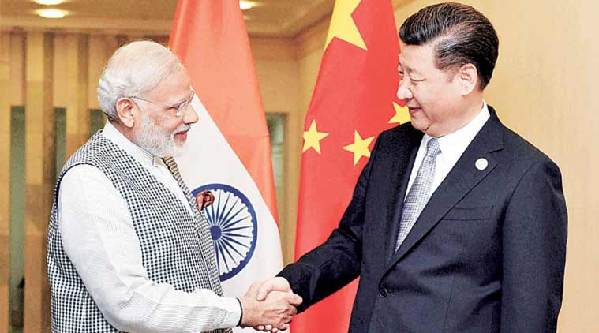Dealing with China: India should do as US does, not says
- By Shastri Ramachandaran
 0 Comment(s)
0 Comment(s) Print
Print E-mail China.org.cn, July 8, 2016
E-mail China.org.cn, July 8, 2016
|
|
|
Indian PM Modi asked President Xi to make fair and objective assessment of India application. |
Long after the Nuclear Suppliers Group (NSG), at its Seoul plenary in June, scuttled India's bid for membership, the effects of that outcome are yet to fade away.
The battle seems to have been joined by the media, too. State-run media in China have not pulled any punches in what they have to say about public sentiment and "nationalists" in India. Leading media in India, although privately owned, have risen to defend the realm and are returning the compliment in full measure.
The leadership - in New Delhi as well as in Beijing - is unlikely to be ruffled so long as the war of words is waged by "paper tigers." In fact, the two governments may see this process of letting off steam as even useful at a time when feelings are running high in India.
However, there are powerful interests, such as the United States, which would like to keep New Delhi and Beijing bristling at each other. Washington's undue interest in "guiding" the Government of India (GoI) to keep up tensions, if not hostility, with China was all too evident during the recent visit to New Delhi of U.S. Under Secretary for Political Affairs Tom Shannon.
In what might be interpreted as gratuitous advice, Shannon said that China "must be held accountable (and) not isolated" for blocking India's entry into the nuclear club. He harped on the tune of the U.S. having been all for India's NSG membership, and of China being the one country that broke the consensus.
This glosses over the reality that - regardless of GoI's miscalculated bid for NSG membership - India's entry being stalled also exposes Washington's failure and the limits of U.S. power. The U.S. created the NSG and wrote its rules. It is the U.S. that has held out to India, since 2010, the promise of NSG membership. Since the U.S. set up the NSG in 1974 to contain and isolate India, it is for the US to ensure India's entry into the NSG. This is also a line of thinking among influential sections in India.
Thus, India's bid for NSG membership is premised on two bilateral tracks - India-U.S. and Sino-Indian - then the outcome is more of a rebuff to Washington than to New Delhi. In the event, it is a score to be settled by the U.S. and not India. The boot, for holding China alone accountable, if at all, is on the other foot.
The truth is that the U.S., while nudging others to lock horns with China, is itself wary of doing so. In acting thus, the U.S. is, as expected, only pursuing its best interests. Likewise, those being favored with Washington's advice would do well to safeguard their own national interests; and, accordingly, check whether the U.S. matches its words and deeds.
A few months ago, when India dithered by issuing and revoking visas granted to Chinese dissidents, including a so-called "terrorist" wanted by Beijing, the U.S. was hosting a communist party delegation from Tibet.
Again, in June, the U.S. did not walk the talk on the South China Sea (SCS) issue, though it wants Asian countries to line up against China. At the 15th Shangri La Dialogue - as the Asia Security Summit of the IISS is known - the U.S. took a soft line on the SCS. While speaking on the conflict, U.S. Defense Secretary Ashton Carter was actually talking about cooperation with China, the common interests of the U.S. and China, and global issues on which Washington and Beijing shared views.
Carter did not concede the SCS issue or even Asia-Pacific Security any centrality in Sino-U.S. ties. He must have been mindful that soon after the Shangri La talk show, top U.S. and Chinese officials were meeting in Beijing for their annual Strategic and Economic Dialogue (S&ED), where serious and substantive business is negotiated.
Secretary of State John Kerry led the security track while Treasury Secretary Jacob Lew headed the economic channel. At the (S&ED), the U.S.-China relationship was aptly captured by President Xi Jinping who recalled a Chinese verse, which says: "Rivers always take meandering paths before reaching their destination."
For his part, Lew said that China-U.S. "economic relationship is the most important economic relationship in the world." (They are the world's two largest economies).
Thus, when the "G2" meet, the dialogue is marked by compliments and the focus is on shared interests. Both sides are so keen to keep the communication going that there is not the least note of confrontation or conflict. Their interdependence ensures that it has to be so.
Similarly, the sooner New Delhi recognizes it pays to do as the U.S. does, not as it says, ties with China would rise to the next level, and Sino-Indian interdependence would take care of the rest.
Shastri Ramachandaran, an independent Indian political and foreign affairs commentator, is a Senior Consultant & Editor of China-India Dialogue, published by China International Publishing Group (CIPG). He may be contacted at: shastriji@hotmail.com
Opinion articles reflect the views of their authors, not necessarily those of China.org.cn.







Go to Forum >>0 Comment(s)